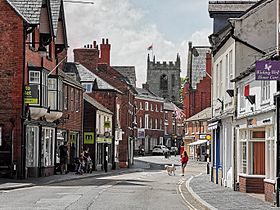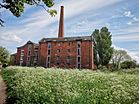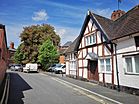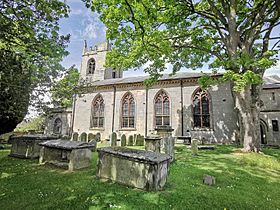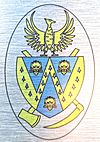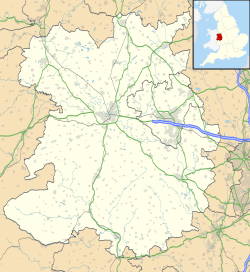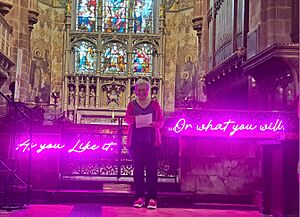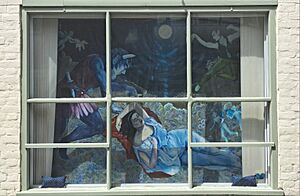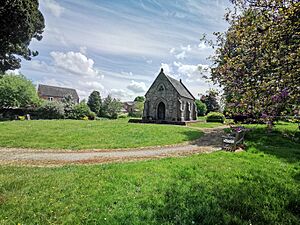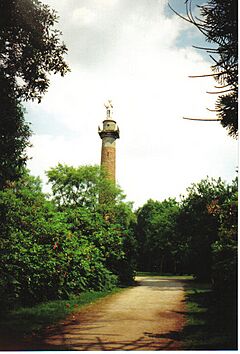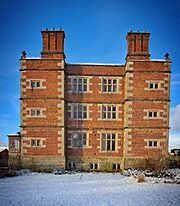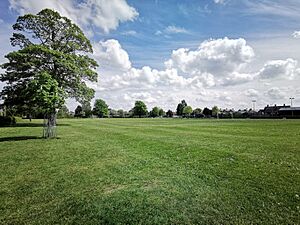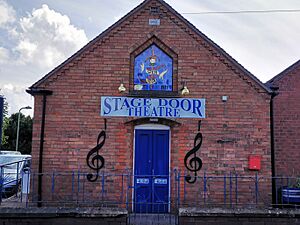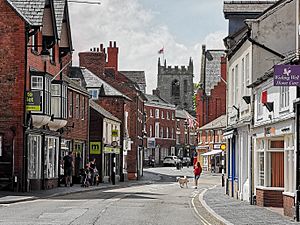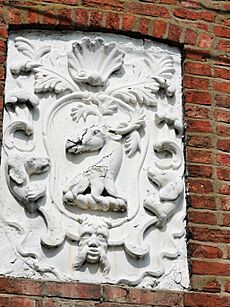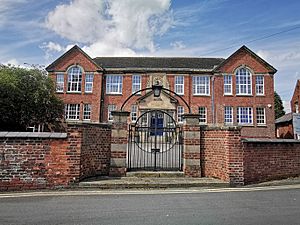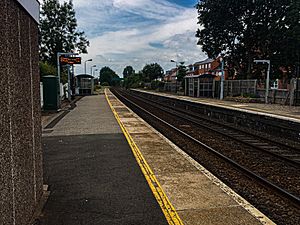Wem facts for kids
Quick facts for kids
Wem
|
|||
|---|---|---|---|
|
Clockwise from top: Wem High Street, Nobel Street, Church of St Peter and St Paul, the Old Wem Mill
|
|||
|
|||
| Sovereign state | United Kingdom | ||
| Constituent country | England | ||
| Region | West Midlands | ||
| Ceremonial county | Shropshire | ||
| Local government | Shropshire | ||
| Website | Wem Town Council | ||
| Norman Castle Town planned | c. 1066 | ||
| Market charter granted | 1202 | ||
| Seat | Edinburgh House | ||
| Government | |||
| • Type | Town council | ||
| Area | |||
| • Total | 1.41 sq mi (3.66 km2) | ||
| Elevation | 269 ft (82 m) | ||
| Population | |||
| • Total | 6,100 | ||
| Demonym(s) | Wemian | ||
| Time zone | GMT | ||
| • Summer (DST) | BST | ||
| Post code |
SY4
|
||
| Area code(s) | 01939 | ||
| Police force | West Mercia Police | ||
| Fire service | Shropshire Fire | ||
| Ambulance service | West Midlands | ||
| Website | https://www.wem.gov.uk/ | ||
Wem is a lively market town in Shropshire, England. It's about 9 miles north of Shrewsbury and 9 miles south of Whitchurch.
The name 'Wem' comes from an old English word, wamm, which means 'marsh'. This makes sense because there used to be a lot of marshy land around the town.
For many centuries, Wem was an important center for justice and local government. It was the main town for a large area called a barony and a big manor (a large estate).
Some people think the beautiful landscape around Wem might have inspired Shakespeare's famous play, 'As You Like It'. The town celebrates this idea with special cultural events.
Contents
History of Wem
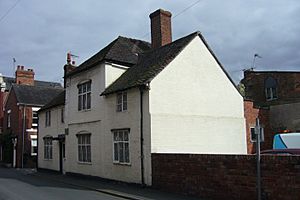
The name of Wem comes from the Saxon word "Wamm", meaning a marsh. This is because marshy land was common in the area. Over time, the name changed to "Wem".
People believe that the area where Wem is now was settled even before the Romans arrived in Britain. The Cornovii, a Celtic tribe from the Iron Age, lived here.
Wem is mentioned in the Domesday Book, a famous survey from 1086. It was listed as four manors (large estates) in the hundred of Hodnet. In 1202, Wem officially became a market town, which meant it could hold regular markets.
During the English Civil War, Wem supported the Parliamentarians. In 1643, Lord Capel attacked the town, but the people of Wem bravely defended it and held off the attackers.
In 1677, a big fire destroyed many of the wooden buildings in Wem. This was a common problem in towns back then.
Sweet Pea Capital
The sweet pea flower was first grown for sale in Wem. A nurseryman named Henry Eckford developed a new type of sweet pea in 1882. He moved to Wem in 1888 and created many more varieties. There's even a road in Wem called Eckford Park!
Every year, the Eckford Sweet Pea Society of Wem holds a special sweet pea festival. In Victorian times, Wem was known as "Wem, where the sweet peas grow."
Brewing History
People were making beer in Wem as early as 1700. A local writer, Richard Gough, even wrote about how good Wem's ale was.
By 1900, a company called Shrewsbury and Wem Brewery Company was making beer on a large scale. This company was later taken over by Greenall Whitley & Co Ltd, but the brewery closed in 1988.
A new brewing company, Hanby, started in Wem in 1988. It was later renamed Wem Brewing Company.
The Wem Ghost Story
In 1995, a fire destroyed the Wem Town Hall. An amateur photographer took a picture that seemed to show a ghostly figure of a young girl in old-fashioned clothes in a window of the burning building.
The photographer, who passed away in 2005, said the photo was real. However, after his death, some people noticed that the girl in his photo looked very much like a girl in a postcard of the town from 1922.
Culture and Fun in Wem
Shakespeare and Wem
Wem celebrates its connection to William Shakespeare with cultural events and Midsummer festivals. These events sometimes include opening private woodlands for visitors and putting on plays.
Local Legends
Secret Tunnels
People say there are secret tunnels under the old castle mound in Wem. These tunnels supposedly lead to a building called "The Moathouse" and then under Mill Street to Roden House. There are even blocked doorways in the cellars of these houses.
Witchcraft Tales
Around 1660, some people in Wem thought they had found a witch. The suspected witch was brought before Thomas Hill, a local judge. Luckily, she was not put on trial as a witch, and the case was handled gently for that time.
Treacle Mines
Wem is famous for having "treacle mines," even though you can't actually mine treacle (a thick, sweet syrup). There are two ideas about how this legend started:
- One idea is that a candy shop always had sweets, even during World War II when food was rationed.
- Another idea is that a sticky byproduct from the town's leather-making industry looked like treacle.
Places to Play and Relax
Wem has great places to relax and play, like the Wem Recreation Ground and the Millennium Green. The Wem Millennium Green is actually the smallest one in the whole country!
Events in Wem
Wem hosts several fun events each year:
- A traditional town carnival is held on the first Saturday of September.
- The Sweet Pea Festival takes place on the third weekend of July.
- The Wem Vehicles of Interest Rally & Grand Parade also happens alongside the Sweet Pea Festival on Sunday.
- A Wem 10km running race started in 2019.
- There's also an annual Wem Transport show in July.
Cool Places to Visit Nearby
- Hawkstone Park – A historic park with beautiful gardens. It's linked to legends of King Arthur and the Holy Grail.
- Soulton Hall – This is the historic home of Sir Rowland Hill.
- Hawkstone Abbey Farm – The main office for Appleby's Dairy, which used to be part of the Hill family's estates.
- Hawkstone Hall and Gardens – Another grand house from the Rowland Hill family.
- Whixall Marina – A marina on The Llangollen Canal, which is part of the Shropshire Union Canal.
- Fenn's, Whixall and Bettisfield Mosses National Nature Reserve – A special nature reserve with important plants. It's recognized as a Wetland of International Importance.
- Grinshill – A hill visible from Wem. Charles Darwin found his first fossils here when he was young. Stone from Grinshill was even used to build the door frame of 10 Downing Street!
- Hodnet Hall Gardens – A beautiful 60-acre garden.
Sports and Clubs
Wem has many sports clubs:
- Wem Town Football Club
- Wem Cricket Club
- Wem Tennis Club
- Wem United Services Bowling Club
- Wem Bowling Club
- Wem Albion Bowling Club
There are also many clubs and societies:
- Wem Amateur Dramatics Society (started in 1919)
- Sweetpea Society
- Rotary Club of Wem and District
- Wem Sports and Social Club
- The Senior Club
- Wem & District Garden Club
- The United Services Club
- Wem Jubilee Band (a brass band started in 1977)
How Wem is Governed
Wem used to be a very large parish (a local area). In 1866, it became a civil parish.
Today, Wem has a Town Council. This council helps make decisions for the local area. The area for voting in local elections, called the Wem electoral ward, also includes part of the nearby Wem Rural parish.
Economy and Jobs
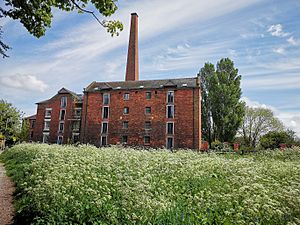
In the past, Wem's economy was mostly based on farming and forestry. They also processed the goods from these activities.
As mentioned before, brewing beer was a big part of Wem's history. A new company, Wem Brewing Company, continues this tradition today.
Wem also has a mid-sized industrial estate on the east side of town, which provides jobs.
Town Symbols
The Wem Town Council uses a special coat of arms. It shows the shield of Shropshire with a phoenix (a mythical bird that rises from ashes) on top. The shield also has an axe and a scythe (a tool for cutting grass) behind it.
Geography and Location
The River Roden flows south of Wem. The Shropshire Way, a long walking path, goes right through the town.
Education in Wem
Wem has a Church of England primary school called St Peters.
Thomas Adams School is a state-funded secondary school that also has a Sixth Form College for older students. It was founded in 1650 and was a grammar school until 1976.
Many private schools have also operated in Wem over the years. For example, the father of famous writer William Hazlitt ran a school here.
Religious Life
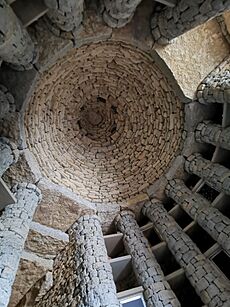
There are four main churches in Wem:
- The Anglican Parish Church of St. Peter & St. Paul
- Baptist Church
- Methodist Church
- Roman Catholic Church
A modern long barrow (a type of ancient burial mound) called Soulton Long Barrow has been built just outside the town.
Local Media
For local news and TV, Wem gets its programs from BBC West Midlands and ITV Central. Radio stations include BBC Radio Shropshire and others. The local newspapers are The Whitchurch Herald and the Shropshire Star.
Transport Around Wem
Train Services
Wem has had train services since 1858 when the Crewe and Shrewsbury Railway was finished.
The town's railway station is on the Welsh Marches Line. Most trains are run by Transport for Wales Rail. They usually travel between Shrewsbury and Crewe. Some longer-distance trains also stop here during busy times, going to places like Manchester Piccadilly and Cardiff Central.
Canals
The closest canals to Wem were at Whixhall and Edstaston. However, the Ellesmere canal was closed to boats in 1944.
Air Travel
There is a small airfield at Sleap near Wem.
Bus Services
Wem is served by the 511 and 512 bus routes, run by Arriva Midlands North. These buses travel between Shrewsbury and Whitchurch. Some buses end their journey in Wem.
| Bus operator | Route | Destination(s) | Notes |
|---|---|---|---|
| Arriva Midlands North | 511 | Shrewsbury → Hadnall → Clive → Wem → Prees → Whitchurch | Some services terminate in Wem. |
Twin Town
Since 1978, Wem has been twinned with Fismes in France. There's even a road in Wem called Fismes Way!
Famous People from Wem
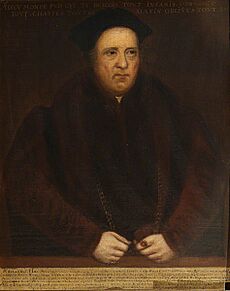

Many interesting people have connections to Wem:
- Sir Rowland Hill (around 1495–1561) – A very important person in Tudor times. He was a Lord Mayor of London and is linked to a character in Shakespeare's play As You Like It. He built Soulton Hall.
- Sir Thomas Adams, 1st Baronet (1586 in Wem–1667/1668) – Another Lord Mayor of London and a Member of Parliament.
- William Wycherley (1641–1716) – A famous playwright who grew up nearby.
- George Jeffreys, 1st Baron Jeffreys (1645–1689) – Known as 'Judge Jeffreys', he took his title as Baron Jeffreys of Wem.
- William Hazlitt (1778–1830) – A well-known essayist, critic, and philosopher.
- Peter Jones (1920 in Wem–2000) – An actor and broadcaster, famous for the radio show Just A Minute.
- Peter Vaughan (1923 in Wem–2016) – A character actor known for roles in Porridge and Game of Thrones.
- Sybil Ruscoe (born 1960 in Wem) – A radio and television presenter.
- Greg Davies (born 1968) – A popular stand-up comedian and actor who grew up in Wem and went to Thomas Adams School.
Sports Personalities
- Edward Whalley-Tooker (1863 in Wem–1940) – A cricketer who played for Hampshire.
- Mary Steedman (1867–1921) – A tennis player who reached the semi-finals at Wimbledon.
- Neil Faith (born 1981) – A semi-retired professional wrestler who went to Thomas Adams School in Wem.
Freedom of the Town
The town of Wem has given the special honour of "Freedom of the Town" to:
Military units
- RAF Shawbury: On August 1, 2018.
See also
 In Spanish: Wem para niños
In Spanish: Wem para niños
 | Kyle Baker |
 | Joseph Yoakum |
 | Laura Wheeler Waring |
 | Henry Ossawa Tanner |


